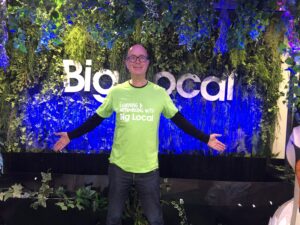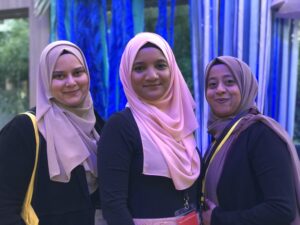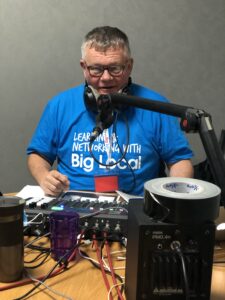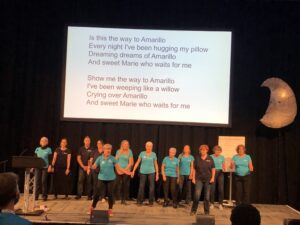Big Local Reconnects
Harriet Marsden, our journalist-at-large, gives her take on Big Local’s biggest event of the year, Big Local Connects 21. A time to reconnect with each other, learn from each other, and most importantly, celebrate some of the incredible things communities around the country have achieved over the past two years.
The Big Local family is back together, as more than 400 people from all over the country attended the annual get together known as Big Local Connects in Nottingham for the first time in two years. The East Midlands Conference Centre welcomed attendees of all ages out of the rain and into the warmth of reconnection, for a packed two-day schedule of events, lectures, arts and fun. With dappled light playing gently on water features, arrangements of flowers and greenery festooning the walls and even a few large birds, the decorations team defiantly turned lockdown on its head and brought the outdoors back in.
We’re back – we made it through!”
Interspersed with representatives from 116 Big Local areas, as well as keynote speakers and experts on a variety of subjects, were the jellybean-bright blue and green T-shirts of tireless Local Trust staff. Almost as bright as the hair colours – I counted turquoise, purple, pink and green (and on Shona from East Coseley, sporting all the above). The joy of being reunited with old friends and colleagues after so long in lockdown, combined with the relief of survival, the excitement of new ideas and sense of purpose.
Off to a sparkly start
In his now-iconic gold sequinned jacket, CEO Matt Leach sprang onto the stage for his opening remarks: “We’re back – we made it through!” He clarified: “Big Local’s back, but it never went away.”
The goal is to create the future, rather than passively predict it
But instead of focussing on the long pandemic, the conference looked firmly towards the future, with themes of environment, community power and youth engagement, and the Day After Tomorrow (DAT) group who are nurturing a vision of continued, coordinated action by Big Local communities after the funding programme ends. The first external speaker, the so-called “reluctant futurist” Mark Stevenson, explained that the goal is to create the future, rather than passively predict it – and, he said, that’s exactly what Big Local is doing. “Bottom-up diverse collaboration” is the name of the game – illustrated beautifully by the Tuneless Choir of Nottingham who then led the audience into a Euros-throwback rendition of Sweet Caroline.
it doesn’t matter about skin colour or background or disability; it’s about how you attract people to your programme.”
The line-up reflected the Big Local ethos of diversity and inclusion, with all sorts of different sessions – practical, interactive, listening, or watching Hamlett Films in the auditorium for stories told in residents’ own words. A wellbeing space with mindfulness activities and arts and crafts provided relief from the joyful hubbub, and the impossibility of walking between any sessions without bumping into a friend, old or new.
Uniqueness and diversity
Like each Big Local area, every session was unique but all featured common preoccupations: how to empower the community, tackle funding applications, make the most of local assets, combat food poverty, face climate change, encourage diversity and engage young people. “At the end of the day,” said teenage Sharanjit Kaur from Heston West, “it doesn’t matter about skin colour or background or disability; it’s about how you attract people to your programme.” Most sessions gave practical tips on how to do just that, suggesting word of mouth recruitment, social media strategy, “treasure-hunting” by identifying existing local assets and skills and collaborating with established initiatives.
A chance to reflect, through art, as well as to mourn and honour.
A sense of friendly informality complemented the underlying structure of the conference, all commentated by its very own Connects radio show, hosted by Chris Allen of Wolverhampton whose drive-time tunes and on-the-fly interviews provided near-constant entertainment. On Friday night, though, you’d have been hard pushed to hear him over the sound of a raucous banquet and musical bingo (plus two disco grannies in metallic boiler-suits). Younger attendees helped more mature guests identify songs by Justin Bieber and Carly Rae Jepson; vice versa for Rick Astley and Diana Ross.
One powerful exception to the forward focus was The Long Lost Year art project: a collaboration between The Loss Project, Local Trust and collective RIOT SOUP that lets Big Local residents creatively express what they’ve learnt – and lost – throughout the pandemic. A chance to reflect, through art, as well as to mourn and honour. Attendees were invited into a colourful chill-out zone of bean bags to make a collage to hang on the washing line, or contribute a poem in the form of a letter to a loved one, or a postcard detailing what they had lost or found throughout lockdown. Trying to summarise nearly two years of pain and growth, via Pritt-sticks and coloured cut-outs, was surprisingly cathartic.
Building youth engagement
Saturday’s Youth Forum was surely the most well-attended session, and it was refreshingly heartening to see so many adults listen carefully to the insight of young people. Luci Busescu (Marsh and Micklefield), Layba Nisar and Sharanjit Kaur (Heston West), and Big Local Little Voices dream-team Lewis Jones and Chloe Adams (Grace Mary to Lion Farm), shared their concerns for the future and their suggestions for encouraging youth involvement. As Luci said, “I started working for M&M because they valued my opinion.”
The great finale
The event closed with a performance from a poetry collective from Par Bay and Kingswood & Hazel Leys – performing on stage together for the first time. As they said together: “Communities are the outcome, not the starting point of change.”
As guests streamed out of the conference centre, Matt Leach summarised everybody’s final impression of the event: “Fantastic, exhausting, amazing.”
“The great thing about Big Local,” he went on, “is that you’ve got people here who’ve been working for ten years to make their communities better – who’ve gone through incredibly difficult times. The sorts of challenges they’ve faced filters out the sort of people who aren’t resilient, and incredibly positive and resourceful.
“And what happens when you bring 400 people like that all together at one place at one time? You get an explosion of happiness – of excitement, of new ideas and new connections. All of that and more.”
Harriet is Local Trust’s journalist at large. She is travelling the country meeting communities in Big Local areas and writing about their stories.
If your Big Local has a story to share, a project you’re keen for Harriet to come and see, or if you just want to say hi and have a chat, get in touch via email or Twitter.




